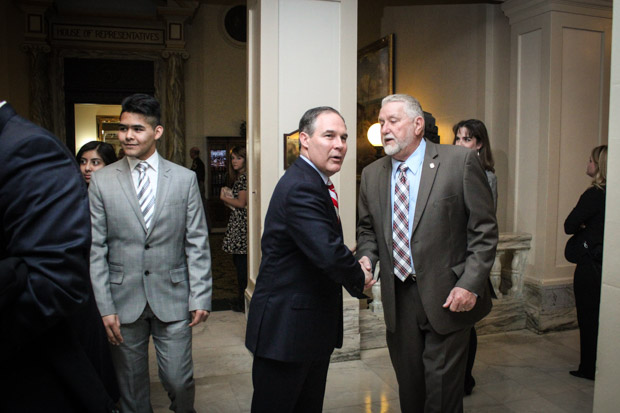
Trump’s Nomination of Pruitt to EPA Casts Spotlight On States’ Crusade Against Federal ‘Overreach’
-
Joe Wertz

Joe Wertz / StateImpact Oklahoma
Donald Trump wants Scott Pruitt to run the U.S. Environmental Protection Agency. The Oklahoma attorney general is a fierce ally of fossil fuel companies and one of the EPA’s biggest opponents. The nomination draws a sharp line dividing industry and environmentalists that could test the limits of another big fight: state sovereignty.
A Republican president created the EPA. Using words and phrases that, today, might jeopardize his career before it ever left a state GOP primary, Richard Nixon urged Congress to sign off on what he called his “environmental agenda.”
“Each of us across this great land has a stake in maintaining and improving environmental quality,” said Nixon in a 1972 message to Congress. “Clean air and clean water, the wise use of our land, the protection of wildlife and natural beauty, parks for all to enjoy — these are part of the birthright of every American.”
The federal environmental agency was built around a pretty simple idea: Pollution is an enemy that does not stop at state lines. The only way to beat it, Nixon said, was if states joined a “coordinated attack” led by the federal government.
Fossil fuels, federal fights
Today, Republicans accuse the EPA of attacking a lot more than pollution. Leading the charge, Oklahoma AG Scott Pruitt.
“When the EPA exceeds the constraints placed upon the agency by Congress, the relationship is thrown out of balance and the rule of law and state sovereignty is affected adversely,” Pruitt said in May 2015, testifying against the Clean Power Plan before a Senate subcommittee on the environment.
Oklahoma oil and gas companies applauded the Pruitt nomination. Conservative politicians and commenters are happy, too. Pruitt built his brand fighting what he calls federal “overreach.” Shortly after he was elected as the Oklahoma AG, he created a brand new “federalism unit” devoted to fighting for more states rights — in court.
Pruitt has sued the EPA and joined other lawsuits against it. He’s made it his mission to block rules on mercury and cross-state air pollution and Obama’s signature Clean Power Plan.
The Pruitt pick was roundly admonished by environmental groups.
David Goldston, director of government affairs for the National Resources Defense Council, says the Pruitt nomination is about protecting fossil fuels, not defending states’ rights. He points to Pruitt’s statements denying a scientific consensus on human-linked climate change as evidence of the Oklahoma attorney general’s true motivations.
“Whatever they actually believe, the result is they’re protecting polluters,” Goldston says.
Limited authority
Jody Freeman, the director of Harvard Law School’s Environmental Law program, says EPA administrators have a lot of influence and authority within the federal agency. Administrators hold the purse strings for EPA programs, and they can decide which new programs to pursue — or not pursue.
If appointed, Pruitt would have wide discretion on the enforcement of federal environmental rules, says Freeman, who has advised the Obama White House on energy and climate change and is on the board at ConocoPhillips.
“If he wants to slow down enforcement or treat the states more gently, be a little more lax, he can certainly try to do that,” she says.
But Freeman says Pruitt can’t simply ignore federal rules. “There are legal procedures that prevent Cabinet heads from doing things with the stroke of a pen,” she says.
Freeman also says, historically, courts have been skeptical when they see dramatic changes to federal regulations. “[Judges] are going to be looking for a record that shows them that it wasn’t just entirely politically motivated and that there is a record to show it’s not arbitrary and capricious.”
Dismantle, defend
Critics worry that Trump nominated Pruitt to dismantle the EPA, which the president-elect said he’d like to do. Pruitt declined an interview request, but in Senate testimony against the Clean Power Plan, he defended the EPA’s existence.
“I’m not one who believes the EPA has no role,” he said. “The agency has played a very important role historically in addressing water and air quality issues that traverse state lines.”
Pruitt supporter Todd Hiett was a Republican Speaker of the Oklahoma House when Pruitt was a state senator. Now a corporation commissioner, Hiett says Pruitt has a track record of building consensus and making deals on complicated environmental issues, like the recently settled water deal between the state, Oklahoma City and the Choctaw and Chickasaw nations.
“He’s going to be thorough. He’s going to be fair and he’s going to stay within the confines of the law and. But at the same time he is going to look for practical solutions,” Hiett says.
His predecessor in the Oklahoma AG’s office, Democrat Drew Edmondson, thinks the EPA would be less proactive under Pruitt — but not completely absent.
“There are too many of us who remember what it was like when you couldn’t see a skyline from five miles away because of smog,” Edmondson says. “Nobody wants to return to that time, including Scott Pruitt.”
